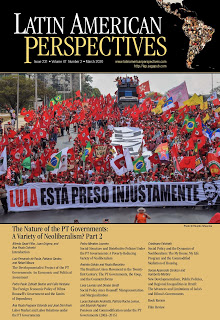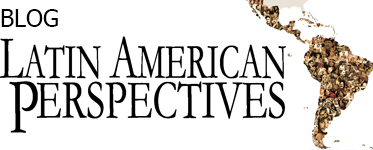
“The Measles from the Time of My Grandfather”: Amazonian Ethnocide Memories in Times of Covid-19
By Carlos Fausto | April 28, 2020
 Professor of Anthropology at the National Museum of the Federal University of Rio de Janeiro, Brazil
Professor of Anthropology at the National Museum of the Federal University of Rio de Janeiro, Brazil
Two weeks ago, Kanari Kuikuro called me from Canarana, a small town in the Brazilian Amazon, where he now lives with his wife and many children. He is originally from the Xingu Indigenous Land, which lies up north and is one of the most culturally rich multiethnic constellation of South America. Kanari was apprehensive.
– Pamü (cousin), […]
Hay que masificar las pruebas contra un virus clasista
Por Marco A. Gandásegui, Profesor de Sociología de la Universidad de Panamá e investigador asociado del CELA. | April 27, 2020
El coronavirus ha alterado todos los parámetros sobre los cuales descansan los supuestos de la vida que conocemos. Especialmente en lo que se refiere al trabajo, al estudio o al ocio. Cada clase social tiene sus propias particularidades. Los dueños del país (uno por ciento de los panameños) siguen recibiendo informes sobre como suben y bajan sus inversiones. A la vez, presionan a los gobiernos para que aumenten sus subvenciones. Por otro lado, muchos empresarios, profesionales y afines […]
Care is not essential
By Iván Sandoval-Cervantes | April 24, 2020
Assistant Professor
Department of Anthropology
University of Nevada, Las Vegas
Although some news sources have highlighted the importance of differentiating between “physical distance” and “social distance”—emphasizing how “social distancing” might imply isolation, which is not good for mental wellbeing (https://www.aljazeera.com/news/2020/03/physical-distancing-social-distancing-200330143325112.html)—while “physical distancing” still allows us to be “alone, together”. The argument is that even when you cannot take care of someone physically, you can still show that you care about someone remotely. It is, of course, perfectly understandable that experts recommend physical distancing in order to slow down the spread of […]
Abstract – Social Structure and Distributive Policies under the PT Governments: A Poverty-Reducing Variety of Neoliberalism
Social Structure and Distributive Policies under the PT Governments: A Poverty-Reducing Variety of Neoliberalism
By Pedro Mendes Loureiro | April 24, 2020
 Brazil’s social structure and associated distributive policies during the PT governments did not depart from neoliberalism but rather implemented a poverty-reducing variant of it. Through minimum-wage hikes, conditional cash transfers, legislation driving financial innovation, and the subsidizing of privately provided for-profit services, state power was used to include individuals in ever-expanding formal circuits of commodity production and consumption. Deprivation in multiple dimensions was indeed reduced through these policies, but in the process […]
Brazil’s social structure and associated distributive policies during the PT governments did not depart from neoliberalism but rather implemented a poverty-reducing variant of it. Through minimum-wage hikes, conditional cash transfers, legislation driving financial innovation, and the subsidizing of privately provided for-profit services, state power was used to include individuals in ever-expanding formal circuits of commodity production and consumption. Deprivation in multiple dimensions was indeed reduced through these policies, but in the process […]
Brazil and the Fight Against Many Pandemics
By David Miranda, Fernanda Melchionna, and Sâmia Bomfim
Federal Representatives of the Socialism and Freedom Party (PSOL) in Brazil | April 23, 2020
While the national health system collapses and the new coronavirus reaches hundreds of thousands of people, Brazil is facing a struggle against more than one pandemic.
The most recent and dramatic one is that of COVID-19. But the impact of the virus is exacerbated by epidemics of political authoritarianism, social inequality and violence, including gender violence, that punish the country, as an example of what occurs around the world. Under the command of what is perhaps the worst president […]
The Trump of the Tropics Virus
By Cliff Welch, São Paulo, Brazil | April 20, 2020
With the Covid-19 pandemic, most days’ news reminds me of Marx’s phrase about history repeating itself, first as tragedy, second as farce. As I regularly consume news about the United States, the tragedy plays out daily in the magnitude of the disease’s spread, the runaway death count and the ineffective, egocentric responses of President Donald Trump. In contrast, news about governors like New York’s Andrew Cuomo and California’s Gavin Newsom, stimulate hope. But, here in Brazil, hope is presented as a horizon sublimely blind to facts learned the hard way […]
Abstract – Labor Market and Labor Relations under the PT Governments
Labor Market and Labor Relations under the PT Governments
by Ana Paula Fregnani Colombi, José Dari Krein | April 22, 2020
 There is some consensus on the foreign policy of Dilma Rousseff’s government that Brazil lost prestige and international influence because of her lesser personal dedication. Against this consensus, the paper presents two alternative hypotheses for explaining its unsatisfactory outcomes: that there was no change in policy objectives but an adaptation to a more hostile context and that its limitations were structurally related to dependency on global corporations and to the increasing rejection of […]
There is some consensus on the foreign policy of Dilma Rousseff’s government that Brazil lost prestige and international influence because of her lesser personal dedication. Against this consensus, the paper presents two alternative hypotheses for explaining its unsatisfactory outcomes: that there was no change in policy objectives but an adaptation to a more hostile context and that its limitations were structurally related to dependency on global corporations and to the increasing rejection of […]


